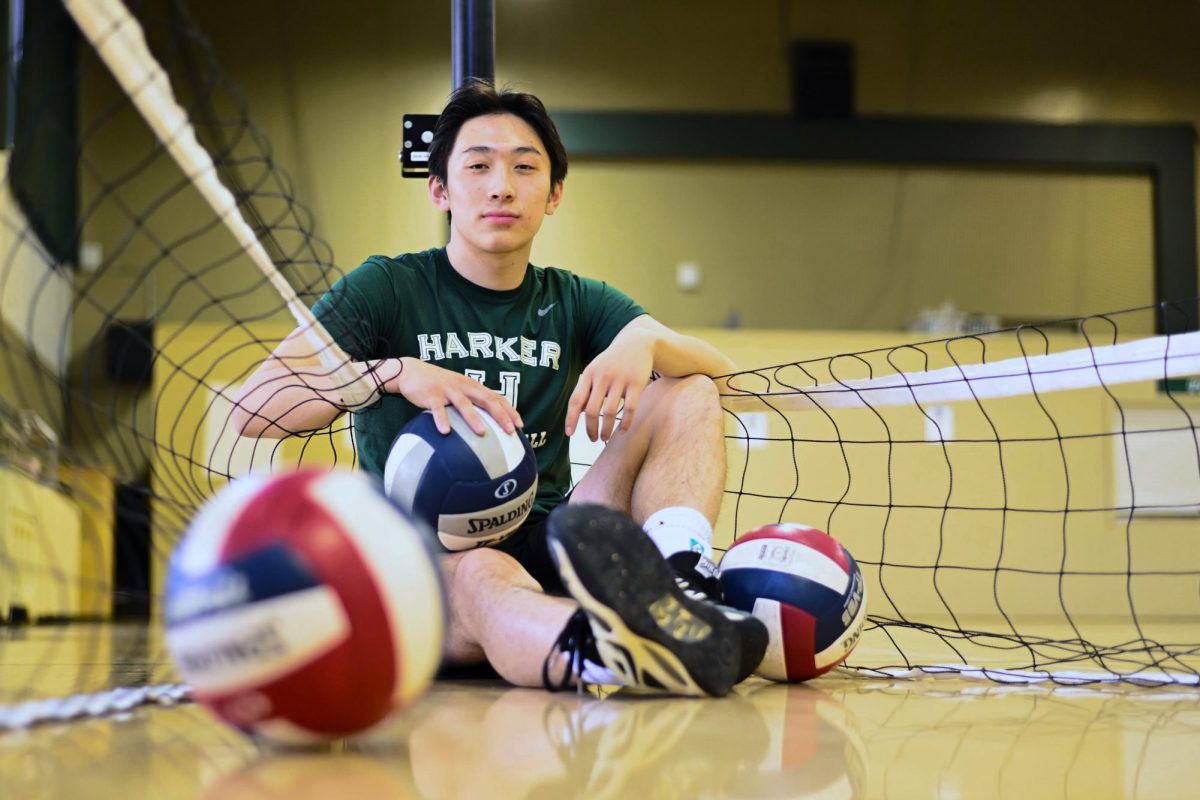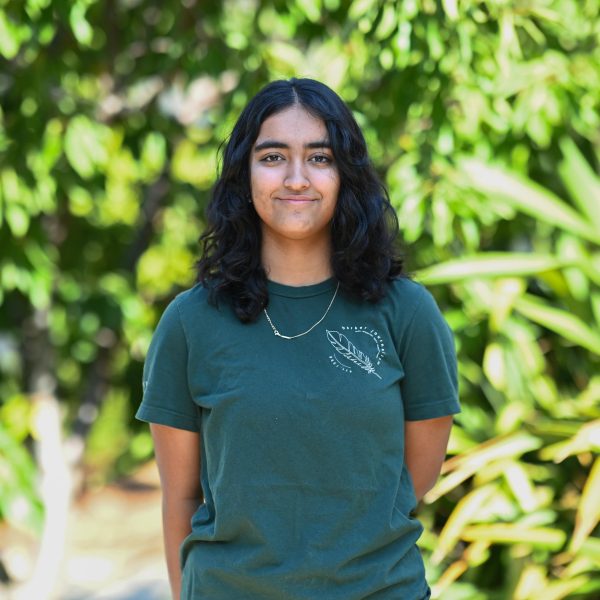Students file out of the college building with newfound knowledge about molecules and mixed feelings about the experience they just shared at the University of California Berkeley campus over summer. Some realize science isn’t for them, while others are willing to experiment with the subject. Among them, Spencer Mak (12) walks out, finding the experience pushed him closer towards the path of neuroscience, rather than away from it.
Although he maintains a busy schedule, Spencer still takes part in many activities including leading the neuroscience club, playing volleyball and playing the guitar in his free time. He manages to balance his coursework along with these extracurriculars, driven by the enjoyment he finds in each.
“When I do something, I want it to be something that I’m actually passionate about.” Spencer said. “I’m not going to commit myself to something that I might be reluctant to put the time into. So whether it’s my courses or my extracurriculars, all of it is something that I’m actually passionate about and have a genuine curiosity about academically and then in extracurriculars.”
Spencer’s thoughtful and caring personality shines through to his friends, who admire how he genuinely cares about their struggles and puts them over himself when necessary. Close friend Kuga Pence (12) finds his diligence to his work and his friends inspiring.
“Even though it seems like he has no time on his hands, he makes time to hang out with his friends.” Kuga said. “And that’s where his motivation shines through. It’s not pushing aside everything to focus on the things that he’s motivated to do. He’s always open to adding more things to his checklist of things to complete throughout the day.”
After his grandmother experienced a severe stroke, Spencer found that most of the treatments for the loss of cognitive skills were ineffective. He feels motivated by the chance to contribute to finding better treatments that are less painful and time consuming for the patient. To grow closer to his goal, Spencer worked hard to create the neuroscience club in his junior year and got it officially approved in the fall of his senior year. Although he considered it difficult, Spencer found the club a place where he could talk about his love for neuroscience and share it with others.
“The hard part about neuroscience club is the nerves and presenting what you have to present and then bringing what you prepare to the table and seeing whether people will like it or not,” Spencer said. “Because the meeting could be a complete failure, it could be a complete success. But what really makes me excited about it is talking about things I have to present or introducing things to the members.”
Spencer takes his presentations seriously and relies on his social skills to lead the club, putting thought, effort and work into making a presentation that the members would like. Close friend Luke Mehta (12) sees his growth since middle school and the assurance he has in himself.
“He used to be super shy,” Luke said. “Back in middle school he would only talk to his close friends and he would have a little trouble talking compared to some of my other friends. And over the years I’ve watched him gain confidence and become more mature in his interactions with other people.”
Spencer also plays volleyball, another activity where he utilizes his ability to communicate. After joining the sport in sixth grade, Spencer found himself driven to its stress relieving nature and competitive environment. He also likes how he is able to continuously improve at volleyball.
Although some games lead to failure, Spencer values the lessons that he gains from the experience instead of being upset about a loss. He takes information he learned from his plays and works to hone his skills.
“Volleyball honestly had the most effect on me throughout my years in middle school and high school,” Spencer said. “Maturing a lot in terms of how to take a loss, how to take failure, and then be sad about it and let yourself be sad about it, but also be able to take out of that experience what you need to work on. And that’s something that’s now super important to me because I’m no stranger to failures and losses.”
Spencer works to improve in volleyball whenever he finds the time, setting the ball while sitting around or hitting it against a tree. He also stays late in practices if he wants to refine his technique.
People around him notice his willingness to learn from his mistakes and accept failure. Upper school calculus teacher Caren Furtado admires Spencer’s ability to listen to others and his desire to better himself.
“For his willingness to accept any feedback, that is his biggest strength,” Furtado said. “He is able to listen. He is able to parse what makes sense and what doesn’t. He’ll ask questions about whatever you have to say, and then he actually does something about it.”
In balancing both schoolwork and social connections, Spencer ensures he does everything with determination and motivation to improve. Taking each new thing one step at a time, Spencer strives to pursue what he is passionate about through constantly working to be the best version of himself.
“If you could fly before you even knew how to walk, wouldn’t that be sad?” Spencer said. “Literally, as a kid, I learned how to run before I could walk. So I was running into walls everywhere. And figuratively, I’ve experienced that throughout my whole life. Running into walls, trying to do the complicated stuff because it was so fascinating before I could do the fundamental stuff. And being able to learn from that was definitely important to me.”


















![“[Building nerf blasters] became this outlet of creativity for me that hasn't been matched by anything else. The process [of] making a build complete to your desire is such a painstakingly difficult process, but I've had to learn from [the skills needed from] soldering to proper painting. There's so many different options for everything, if you think about it, it exists. The best part is [that] if it doesn't exist, you can build it yourself," Ishaan Parate said.](https://harkeraquila.com/wp-content/uploads/2022/08/DSC_8149-900x604.jpg)




![“When I came into high school, I was ready to be a follower. But DECA was a game changer for me. It helped me overcome my fear of public speaking, and it's played such a major role in who I've become today. To be able to successfully lead a chapter of 150 students, an officer team and be one of the upperclassmen I once really admired is something I'm [really] proud of,” Anvitha Tummala ('21) said.](https://harkeraquila.com/wp-content/uploads/2021/07/Screen-Shot-2021-07-25-at-9.50.05-AM-900x594.png)







![“I think getting up in the morning and having a sense of purpose [is exciting]. I think without a certain amount of drive, life is kind of obsolete and mundane, and I think having that every single day is what makes each day unique and kind of makes life exciting,” Neymika Jain (12) said.](https://harkeraquila.com/wp-content/uploads/2017/06/Screen-Shot-2017-06-03-at-4.54.16-PM.png)








![“My slogan is ‘slow feet, don’t eat, and I’m hungry.’ You need to run fast to get where you are–you aren't going to get those championships if you aren't fast,” Angel Cervantes (12) said. “I want to do well in school on my tests and in track and win championships for my team. I live by that, [and] I can do that anywhere: in the classroom or on the field.”](https://harkeraquila.com/wp-content/uploads/2018/06/DSC5146-900x601.jpg)
![“[Volleyball has] taught me how to fall correctly, and another thing it taught is that you don’t have to be the best at something to be good at it. If you just hit the ball in a smart way, then it still scores points and you’re good at it. You could be a background player and still make a much bigger impact on the team than you would think,” Anya Gert (’20) said.](https://harkeraquila.com/wp-content/uploads/2020/06/AnnaGert_JinTuan_HoHPhotoEdited-600x900.jpeg)

![“I'm not nearly there yet, but [my confidence has] definitely been getting better since I was pretty shy and timid coming into Harker my freshman year. I know that there's a lot of people that are really confident in what they do, and I really admire them. Everyone's so driven and that has really pushed me to kind of try to find my own place in high school and be more confident,” Alyssa Huang (’20) said.](https://harkeraquila.com/wp-content/uploads/2020/06/AlyssaHuang_EmilyChen_HoHPhoto-900x749.jpeg)





